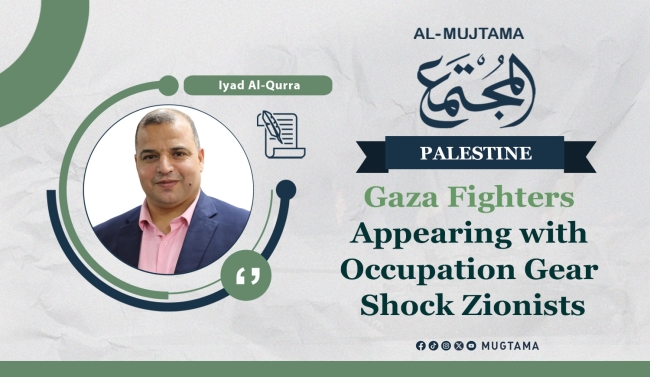In scenes of significant and unprecedented implications, footage emerged of Palestinian resistance fighters using "Israeli" equipment and military vehicles that were seized during the "Al-Aqsa Flood" battle on October 7th. These images were not merely a display of power; they constituted an earthquake within the "Israeli" military and media system. They raised questions about the capacity of the Zionist army to protect its equipment and military positions, revealing the fragility of its security apparatus, which it has long bragged about.
Varied Reactions and Decline in Trust
The "Israeli" reactions were varied. While military and political leaders expressed shock and acknowledged the intelligence and military failure, Hebrew media attempted to justify what happened or downplay its consequences. However, at the same time, they could not deny the magnitude of the blow Israel faced on both military and psychological levels, as these scenes affected the "Israeli" public, leading to an unprecedented decline in trust in the army and an increase in fears regarding the rise of Palestinian resistance capabilities.
Breaking the Prestige of the Occupation Army: The Fall of the Myth
"Israel" has long promoted itself as possessing the "strongest army in the region," relying on its military, technological, and intelligence superiority. However, what occurred on October 7 turned this equation upside down when resistance fighters were seen roaming inside Gaza using "Israeli" armored vehicles and weapons they seized from fortified military sites. These scenes represented a fatal blow to the image of the occupation army, not only in the Zionist interior but to the entire world.
Admission of Failure
Hebrew media did not hesitate to admit this truth, with the newspaper "Maariv" describing the scene as: the biggest blow to the image of the "Israeli" army in decades; seeing our tanks and weapons in the hands of Hamas is more than just a military loss; it is a national humiliation. This failure was not merely a tactical error; it exposed serious weaknesses in the Zionist security doctrine. Instead of the "Israeli" army controlling the course of the war, it found itself in a position of self-defense after its positions fell into the hands of the resistance. The situation became even more critical given that these scenes came after years of development and modernization carried out by the enemy army, raising questions about the effectiveness of these updates if the resistance was able to penetrate military sites and seize equipment so easily.
Impacts of the Scenes on Zionist Society: Fear and Doubts
These scenes were not just a display of power from the Palestinian resistance; they caused a profound shock in "Israeli" society. For the first time in decades, "Israelis" found themselves in a new reality, where the occupation army was no longer the force that protects them and provides them with absolute security. This shock directly impacted the general mood in the Zionist entity, with unprecedented increases in levels of anxiety and fear.
Decline in Trust and Security Failure
According to a public opinion poll published by the newspaper "Yedioth Ahronoth," trust in the military establishment dropped by 20% following these scenes, marking the largest decline in "Israelis'" confidence in their army since the October War in 1973. This decline was not only due to the loss of military equipment but also because it revealed a widespread intelligence and security failure, making Zionists feel they were facing a threat they had not anticipated.
Political and Military Leadership Criticized
The influence did not stop at the "Israeli" street but extended to include political and military leadership. Internal criticisms have escalated, with the opposition accusing Prime Minister Benjamin Netanyahu and his government of failing to protect the security of the entity. Several former officials have also called for extensive investigations into the failures that led to this catastrophic scenario.
Psychological Shock and Rebuilding Trust
On the other hand, military analysts believe that the psychological shock caused by these scenes within the occupied entity will be long-lasting, and it will not be easy to rebuild trust in the army again, especially if the resistance continues to display its strength through new operations.
Calls for Firm Response and Escalation
Calls for a firm response and escalation of aggression have intensified. With rising anger within the Zionist entity, the occupation government has tried to project strength by threatening further military operations in Gaza. Prime Minister Benjamin Netanyahu stated during a meeting with military leaders: "These scenes are serious and shocking. We must restore the dignity of our army immediately and not let Hamas mock us in this way."
Skepticism and Extremist Voices
However, despite these statements, many "Israeli" analysts are skeptical about the army's ability to achieve any military success that restores lost confidence. Resistance has proven its ability to adapt to military attacks and has made qualitative breakthroughs in the Zionist security system. At the same time, extremist voices within the entity have called for an unprecedented escalation against Gaza, considering that allowing the Palestinian resistance to appear in this manner represents "an insult that must be erased at all costs."
Escalation Risks and Fears
Reserve Colonel Tzvika Vogel, the former commander of the southern region of the "Israeli" army, stated in comments to Channel 12: "The Palestinian resistance has shown that it has dangerously evolving capabilities, and this means we need broader and harsher military operations. We must not allow them to use our equipment against us." But even with these calls, there are "Israeli" fears that any military escalation could end in another disaster, especially if the resistance manages to achieve further field successes or deliver painful blows to the occupying army.
Zionist Society's Contradictory Options
Today, the Zionist society lives between two contradictory options: fear and anxiety over the rising power of resistance, and an indirect acknowledgment of the army's and intelligence's failure to protect them, while calls for revenge and military escalation emerge in an attempt to regain lost prestige.
Lasting Impact on Zionist Consciousness
Regardless of the reactions, the scenes that emerged from Gaza have left an indelible mark on the Zionist consciousness, reminding "Israelis" that the Palestinian resistance is not only capable of withstanding but also of inflicting psychological and military defeat on them. The appearance of the resistance fighters with the occupation's equipment represents a significant shift in the equation of the conflict, impacting the military, media, and psychological battle.
Symbol of Resilience and Victory
While Palestinians and Arabs see these scenes as a symbol of resilience and victory, Zionists view them as a nightmare threatening their national security, undermining their confidence in their army. As prisoner exchanges continue, it seems that the coming days may bring more surprises from the Palestinian resistance, which still holds cards that have yet to be revealed, in light of the occupation's failure to achieve any real field success.


